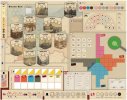Naftalino
Grande Goblin
- Registrato
- 21 Agosto 2014
- Messaggi
- 12.954
- Località
- Genova
- Sito Web
- www.google.com
- Goblons
- 8.456
- Utente Bgg
- Naftalino
- Board Game Arena
- ---
- Yucata
- ---
Da Matthias Cramer, l'autore di giochi come Glenn More, Rococo e Watergate.
Il gioco, un card driven, è ambientato nelle Germania post prima guerra mondiale, dove la fragile democrazia nata dalle convulsioni della sconfitta e dai moti rivoluzionari del novembre 1918 è insiedata a destra e sinistra.
Il gioco però - ed è un grosso però - è pensato per 4 giocatori e non sembrano previsti al momento bot o versioni per due.
https://www.kickstarter.com/projects/skellig-games/weimar-the-fight-for-democracy?ref=discovery
https://boardgamegeek.com/boardgame/265537/weimar-fight-democracy


Da BGG: "Weimar: The Fight for Democracy is a game about the major actors in the spectrum of the new Republic. The Social Democrats and the Conservatives are trying to defend the democracy. Communists and Nationalists are looking to overthrow the government and install their own regime. Will this infant Republic survive? Or will Germany — as in history — fall to the Nazis and become a lawless state? Or will there be a Union of Socialist German Republics?
Weimar includes two major "battlefields": In public opinion, the parties struggle to influence the important political issues like the economy, the media, or foreign affairs. Winning these issues scores points and allows them to take significant decisions. At the same time, the parties try to control the streets and position their followers in the major cities of Germany for demonstrations, street fights, and actions taken by the paramilitary organizations.
Weimar is a tense and exciting card-driven game (CDG) on a most interesting topic. Cards may be played for the event, for public opinion, or for actions in the street.
In each of the six game turns, the parties play one agenda that defines their strategy for the turn (e.g., modifying their twelve-card play deck, defining issues, getting advantages in the streets). The goals of the parties are asymmetrical and contradictory. While the democratic parties score for stabilizing the state and removing poverty, the non-democratic parties score for coups and unrest".
Il gioco, un card driven, è ambientato nelle Germania post prima guerra mondiale, dove la fragile democrazia nata dalle convulsioni della sconfitta e dai moti rivoluzionari del novembre 1918 è insiedata a destra e sinistra.
Il gioco però - ed è un grosso però - è pensato per 4 giocatori e non sembrano previsti al momento bot o versioni per due.
https://www.kickstarter.com/projects/skellig-games/weimar-the-fight-for-democracy?ref=discovery
https://boardgamegeek.com/boardgame/265537/weimar-fight-democracy


Da BGG: "Weimar: The Fight for Democracy is a game about the major actors in the spectrum of the new Republic. The Social Democrats and the Conservatives are trying to defend the democracy. Communists and Nationalists are looking to overthrow the government and install their own regime. Will this infant Republic survive? Or will Germany — as in history — fall to the Nazis and become a lawless state? Or will there be a Union of Socialist German Republics?
Weimar includes two major "battlefields": In public opinion, the parties struggle to influence the important political issues like the economy, the media, or foreign affairs. Winning these issues scores points and allows them to take significant decisions. At the same time, the parties try to control the streets and position their followers in the major cities of Germany for demonstrations, street fights, and actions taken by the paramilitary organizations.
Weimar is a tense and exciting card-driven game (CDG) on a most interesting topic. Cards may be played for the event, for public opinion, or for actions in the street.
In each of the six game turns, the parties play one agenda that defines their strategy for the turn (e.g., modifying their twelve-card play deck, defining issues, getting advantages in the streets). The goals of the parties are asymmetrical and contradictory. While the democratic parties score for stabilizing the state and removing poverty, the non-democratic parties score for coups and unrest".
Ultima modifica:



